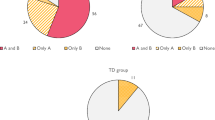Abstract
To identify reasons for discrepancies between parent and child reports of child/adolescents's psychiatric symptoms, parents and adolescents (51 pairs) were asked to guess what the other would answer to questions from the PC-DISC about the adolescent's psychiatric symptoms, and to explain why they expected disagreement when the answer they provided for the other was different from their own. Adolescents' explanations for expecting (1) parental denial of symptoms the adolescent reported were: the parent was unaware of, forgot about, assumed the adolescent could not have, or trivialized the symptom; and (2) parental report of symptoms the adolescent denied were: the parent misread or exaggerated the adolescent's symptom, had too high expectations for the adolescent's behavior, put a negative label on or did not trust the adolescent. Parents' reasons for expecting their children to (1) deny symptoms the parents reported were: the adolescent did not remember how s/he felt, lied, did not recognize or minimized the importance or frequency of the symptom; and (2) report symptoms the parents denied were: the adolescent lied, exaggerated the importance of or interpreted the symptom differently.
Similar content being viewed by others
References
Achenbach, T. M., McConaughy, S. H. & Howell, C. T. (1987). Child/adolescent behavioral and emotional problems: implications of cross-informant correlations for situational specificity.Psychological Bulletin, 101, 213–232.
American Psychiatric Association. (1987).Diagnostic and statistical manual of mental disorders (3rd ed., rev.). Washington, DC: Authors.
Andrews, V. C., Garrison, C. Z., Jackson, K. L., Addy, C. L. & McKeown, R. E. (1993). Mother-child agreement on the symptoms and diagnoses of child depression and conduct disorders.Journal of the American Academy of Child and Adolescent Psychiatry, 32, 731–738.
Chambers, W. J., Puig-Antich, J., Hirsch, M., Paez, P., Ambrosini, P. J., Tabrizi, M. A., & Davies, M. (1985). The assessment of affective disorders in children and adolescents by semistructured interview.Archives of General Psychiatry, 42, 696–702.
Cohen, J. (1960). A coefficient of agreement for nominal scales.Educational Psychological Measurement, 20, 37–46.
Costello, A. J., Edelbrock, C. S., & Costello, A. J. (1985). Validity of the N.I.M.H. Diagnostic Interview Schedule for Adolescents: A comparison between psychiatric and pediatric referrals.Journal of Abnormal Child Psychology, 13, 579–595.
Costello, A. J., Edelbrock, C. S., Dulcan, M. K., Kalas, R., & Klaric, S. H. (1984).Report on the N.I.M.H. Diagnostic Interview Schedule for Children (DISC). Washington, DC: National Institute of Mental Health.
Costello, A. J., Edelbrock, C. S., Kalas, R., Kessler, M. K., & Klaric, S. A. (1982).N.I.M.H. Diagnostic Interview Schedule for Children. Bethesda, MD: National Institute of Mental Health.
Cottler, L. B., Compton, W. M., Brown, L., Shell, A., Keating, S., Shillington, A., & Hummel, R. (1994). The Discrepancy Interview Protocol: A method for evaluating and interpreting discordant survey responses.International Journal of Methods in Psychiatric Research, 4, 173–182.
Edelbrock, C., Costello, A. J., Dulcan, M. K., Calabro Conover, N., & Kalas, R. (1986). Parent-child agreement on child psychiatric symptoms assessed via structured interviews.Journal of Child Psychology and Psychiatry, 27, 181–190.
Edelbrock, C., Costello, A. J., Dulcan, M. K., Kalas, R., & Conover, N. (1985). Age difference in the reliability of the psychiatric interview of the child.Child Development, 56, 265–275.
Herjanic, B., Herjanic, M., Brown, F., & Wheatt, T. (1975). Are children reliable reporters?Journal of Abnormal Child Psychology, 3, 41–48.
Herjanic, B. & Reich, W. (1982). Development of a structured psychiatric interview for adolescent: Agreement between child and parent on individual symptoms.Journal of Abnormal Child Psychology, 10, 307–324.
Kashani, J. H., Orvaschel, H., Burke, J. P., & Reid, J. C. (1985). Informant variance: The issue of parent-child disagreement.Journal of the American Academy of Child and Adolescent Psychiatry, 24, 437–441.
Landis, J. R. & Koch, G. G. (1977). The measurement of observer agreement for categorical data.Biometrics, 33, 159–174.
Loeber, R., Green, S. M., Lahey, B. B. & Stouthamer-Loeber, M. (1989). Optimal informants on childhood disruptive behavior.Development and Psychopathology, 1, 317–337.
Orvaschel H., Puig-Antich, J., Chambers, W. J., Tabrizi, M.A., & Johnson, R. (1982). Retrospective assessment of prepubertal major depression with the Kiddie-SADS-E.Journal of the American Academy of Child and Adolescent Psychiatry, 21, 392–397.
Reich, W., Herjanic, B., Welner, Z., & Gandy, P. R. (1982). Development of a structured psychiatric interview for children: agreement on diagnosis comparing child and parent interviews.Journal of Abnormal Child Psychology, 10, 325–336.
Schaffer, D., Schwab-Stone, M., Fisher, P., Cohen, P., Piacentini, J., Davies, M., Conners, C.K., & Regier, D. (1993). The Diagnostic Interview Schedule for Children—revised version (DISC-R): I. Preparation, field testing, interrater reliability, and acceptability.Journal of the American Academy of Child and Adolescent Psychiatry, 3, 643–650.
Weissman, M. M., Wickramaratne, P., Warner, V., John, K., Prusoff, B. A., Merikangas, K. R., & Gammon G. D. (1987). Assessing psychiatric disorders in children.Archives of General Psychiatry, 44, 747–753.
Welner, Z., Reich, W., Herjanic, B., Jung, K., & Amado, H. (1987). Reliability, validity, and parent-child agreement studies of the diagnostic interview for children and adolescents (DICA).Journal of the American Academy of Child and Adolescent Psychiatry, 26, 649–653.
Author information
Authors and Affiliations
Additional information
Support for this work was provided by National Institute of Drug Abuse grant number DA-05585 (Dr. Cottler, P.I.), and National Institute of Mental Health grants numbers MH-31302 (Dr. R. C. Cloninger, P.I.) and MH-17104 (Dr. Cottler, P.I.).
Address all correspondence, including reprint requests, to Michelle Bidaut-Russell, Ph.D, MPH, MPE, Department of Psychiatry, Box 8134, Washington University School of Medicine, 4940 Children's Place, St. Louis, Missouri 63110.
Rights and permissions
About this article
Cite this article
Bidaut-Russell, M., Reich, W., Cottler, L.B. et al. The Diagnostic Interview Schedule for Children (PC-DISC v.3.0): Parents and Adolescents Suggest Reasons for Expecting Discrepant Answers. J Abnorm Child Psychol 23, 641–659 (1995). https://doi.org/10.1007/BF01447667
Received:
Issue Date:
DOI: https://doi.org/10.1007/BF01447667




